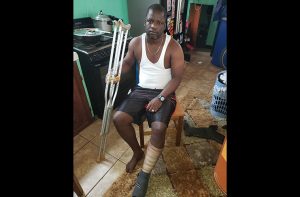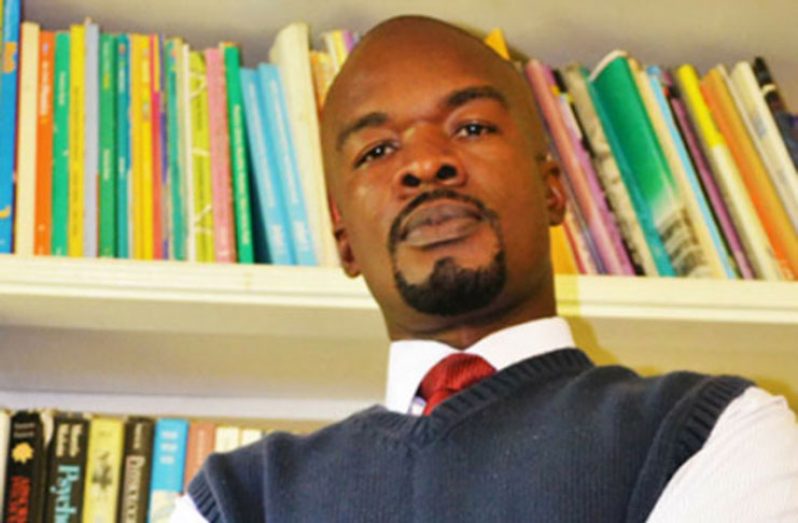– says psychologist Wil Campbell
THE psychological impact of home invasions leaves victims with emotional trauma for years of their lives and is very often difficult to overcome without counselling, Psychologist and University of Guyana (UG) lecturer Wil Campbell has said.
He offered this view in light of the recent attempted robbery at Lodge, Georgetown, in which three bandits were killed in a shootout with police.
The bandits, who were on the police’s radar, were identified as Junior Nurse, Shawn Browne Jr and Leslie Griffith.
“For some people, this can go on for a lifetime, a lot of people suffer from post-traumatic stress, sometimes to the point where it becomes a disorder,” he said.
The psychologist explained that the post-traumatic stress disorder (PTSD) is a mental health condition triggered by a terrifying event, by either experiencing or witnessing it.
Symptoms, he noted, may include flashbacks, nightmares, insomnia and severe anxiety, as well as uncontrollable thoughts about the event.
Post-traumatic stress can be accompanied by depression that can sometimes be fatal, he noted.
“These things actually re-wire your brain so that you are unable to think logically; you can even become paranoid with a feeling that everyone is against you, especially when the victim is reminded of a confrontation due to external circumstances,” he explained.
He said some persons may even suffer from obsessive compulsive disorders, which forces them to become obsessed with being safe.
Obsessive-compulsive disorder (OCD) is an anxiety disorder in which people have recurring, unwanted thoughts, ideas or sensations (obsessions) that make them feel driven to do something repetitively (compulsions).
AFFECT INTERACTIONS
This repetitive behaviour can significantly interfere with a person’s daily activities and social interactions.

According to Campell, not everyone could easily get past this stage of life and would require professional counselling.
Processing the trauma and putting it into the right perspective and challenging irrational thoughts, fears and anxiety that may be pervasive in the victims’ minds, will call for therapy, the psychologist said.
Where children are witnesses to robberies, he said all reminders of what occurred should be removed from their surroundings.
“For example, we often advise people that were awakened by an intruder in their bedroom, and in their mind they can still see that persons standing at the mirror, what that person could do is rearrange the room, so that the mirror is no longer in that place,” he said.
Adding that in the case of the Norton Street robbery where the bandits were killed, the psychologist said the bullet holes on the building should be repaired as quickly as possible to avoid visual reminders of the bad experience.
Another way to overcome such difficulty, he said, is to become involved in a community watch group which helps the person to feel safer.
The victim can also install security cameras, grills, stronger locks, safety windows or “anything that you can actually do to prevent a reoccurrence, gives you a sense of empowerment and being able to do something about what happened.”
Delving deeper into the topic, the psychologist said home invasions are traumatic for many reasons.
“When someone invades your home, there is the fear that you could lose your life, you lose your possessions and that fear doesn’t always go away immediately, even when the danger has passed,” he explained.
He added: “You also feel violated since for most people, home is their private space where they feel the safest and when that space is invaded by force, then that whole sense of safety and security diminishes and is destroyed.”
Campbell said anger also arises if the victim or a member of their family is hurt during a robbery or their property is destroyed.
EMOTIONAL AGONY
The feeling of helplessness, powerlessness and not being able to prevent such an act from occurring causes victims emotional agony.
“If during a home invasion someone is killed or your possessions are taken, you have to deal with a sense of loss; the fact that something dear to you have [sic] been taken without your permission and in spite of your efforts or lack of it to defend yourself or family causes a sense of loss,” he said.
The university lecturer explained that for victims, it is vital to remember that being burgled is not their fault.
Nonetheless, he said people are all too quick to try and ‘get over it’, but it is important to work through the bad experience at a suitable pace.
Counselling and cognitive behavioural therapy are just some of the ways to provide support in managing the emotional impact of crime.
Neville Leslie, of Lot 46 Norton and Victor Streets, who was the victim of the recent attack, said his five-year-old son was removed from his home and is now living by a relative because of fear.
Leslie told the Guyana Chronicle that his son is receiving professional counselling that is being paid for privately.
“Imagine when I talk to my son, he told me, ‘daddy you must buy a gun,’ because of what happened and I had to tell him ‘no son’, that is not the way. He even said he now wants to become a police to protect people,” Leslie said.
He continued: “During his counselling session, he even draw the bandit with the gun in his hand on paper to show the counselor; he even told me he doesn’t want to return home and see me limping around like this.”
Leslie injured his left foot when he jumped out of a window after placing his son in the arms of a policeman during his escape from the bandits.
The Guyana Police Force (GPF) will this week patch up the bullet holes on his home and fix other damage caused during the shootout with the bandits.




.jpg)









